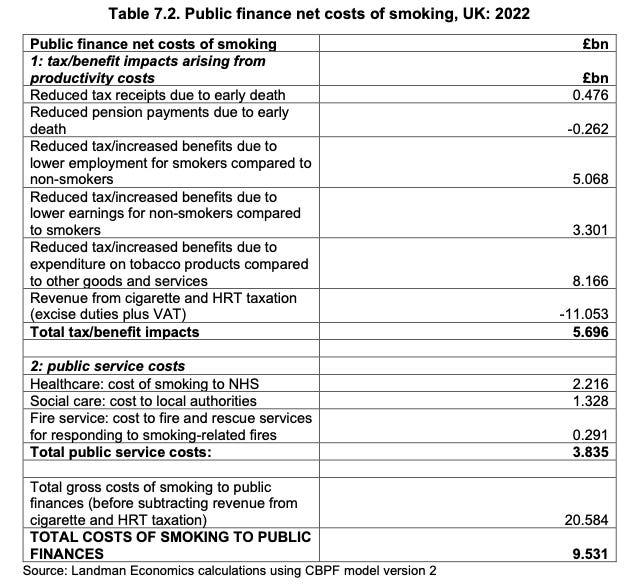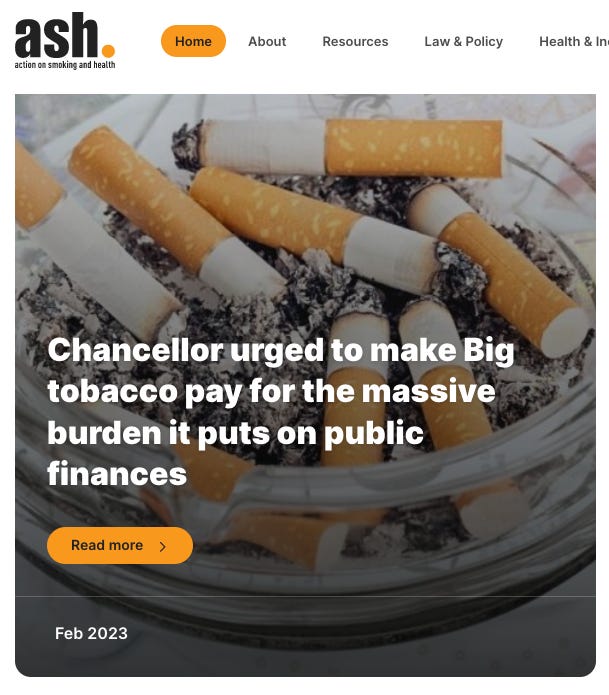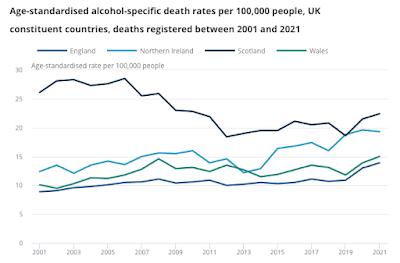If you say that a certain activity costs society £10 billion a year,
most people would assume that if that activity disappears, society will
save £10 billion a year.
They might have different ideas of
what ‘society’ means. Some will assume that the £10 billion is a cost
to taxpayers while others will assume that some of the cost is borne by
private individuals and businesses. But the majority will, quite
reasonably, assume that the cost is to other people, i.e. those who do not participate in the activity.
And
nearly everyone will assume that the £10 billion is money in the
conventional sense of cash that can be exchanged for goods and services.
But
when it comes to estimates from ‘public health’ campaigners about the
cost of drinking/smoking/obesity, all these assumptions would be wrong.
Most of the ‘costs’ are to the people engaged in the activity and they
are not financial costs. Taxpayers would not pay less tax if they
disappeared. In general, they would pay more.
Last month I mentioned an estimate of the ‘cost’ of gambling in the UK and said:
These
studies have no merit as economic research. They are purely driven by
advocacy. The hope is that the average person will wrongly assume that
the costs are to taxpayers and agitate for change.
The
main aim of these Big Numbers is to convince the public that
heavily-taxed activities place a burden on society that exceeds the tax
revenue, thereby justifying yet more taxes and prohibitions.
In
the case of smoking, this has become more and more difficult. Smoking
has been a net gain for the Treasury ever since King James I started
taxing it heavily in the 1600s. Today, as the smoking rate dwindles and
tobacco duty rises ever higher, anti-smoking campaigners have got their
work cut out duping non-smokers into thinking otherwise.
Tobacco
duty brings in about £12 billion a year. For years, groups like Action
on Smoking and Health (ASH) used a figure of £13.74 billion as the ‘cost
of smoking’. This came from a flimsy Policy Exchange report
which included £5.4 billion as the cost of smoking breaks and £4.8
billion as the cost of lost productivity due to premature mortality.
Neither of these are costs to the taxpayer. They are not even external
costs, i.e. costs to non-smokers.
Last year, in a review commissioned by the Department of Health,
Javed Khan came up with a figure of ‘around £17 billion’ as the
‘societal cost’ of smoking. This included ‘reduced employment levels’
(£5.69 billion) and ‘reduced wages for smokers’ (£6.04 billion). Again,
these costs fall on smokers themselves and are not external costs. They
are, in other words, none of the government’s business.
Last week, a report commissioned by Action on Smoking and Health (ASH) pulled out all the stops and announced that the cost of smoking to Britain was now - wait for it! - £173 billion. Go big or go home, eh?
This
is so far adrift from earlier estimates that even the casual observer
might start to smell a rat. The report was written by Howard Reed of
Landman Economics who used to do work for the people who campaigned
against fixed odds betting terminals. He has previously produced a report for ASH
claiming that smoking leads to unemployment and low wages, based on the
simple observation that smokers are more likely to be unemployed and
earn low wages. It is well known that smoking is far more common in
lower socio-economic groups, but it is an absurd leap of faith to assume
that smoking is the cause of unemployment and low wages.
Reed
nevertheless assumed causality and, in his new report, reckons that
smoking-related unemployment and low wages cost society (i.e. smokers)
£15 billion a year.
But that is nothing compared to the £123.7
billion he attributes to the ‘cost of early deaths due to smoking’. He
doesn’t show his workings for this calculation - or any other - but it
is a combination of all the hours that could have been worked if smokers
didn’t die prematurely plus the intangible costs of their lost years of
life.
The savvy reader will have noticed that all these ‘costs’
fall under the category of None Of The Government’s Damn Business. If I
die at the age of 75 rather than 80, I will lose the intangible benefits
of five years of life, but that is my problem. Similarly, if I retire
five years early and lose five year’s income, that’s up to me.
The
absurdity of portraying lost years of life as a societal cost - let
alone as a financial cost - can be illustrated by the example of
contraception. The contraceptive pill has prevented billions of years of
life, but it is very difficult to argue that it has cost society
trillions of pounds. A society doesn’t become richer just because more
people live in it; that’s why we use per capita GDP as the measure of national output, not overall GDP.
Certainly
there are intangible costs to dying prematurely, but these costs fall
on the individual. Moreover, there are intangible benefits to smoking
which reports like this never acknowledge. Since both the intangible
costs and the intangible benefits fall squarely on the smoker, it is for
the smoker to decide whether the costs outweigh the benefits. It is no one else’s business.
The
‘societal cost’ figure of £173 billion is designed to make it look as
if it is everybody’s business, but it is so obviously suspect that ASH
haven’t been using it in their PR. Instead, they have focused on a claim
from the same report that smoking imposes a net cost on taxpayers of
£9.5 billion.
This
estimate doesn’t include the bogus lost output or the intangible costs.
It is more relevant to policy and it takes into account the taxes
smokers pay on their tobacco. But is it plausible?
The figure breaks down as follows…
Reed
says that tobacco duty (plus VAT on the duty) rakes in £11.05 billion
(it is actually more than £12 billion but never mind). The challenge is
for him to find costs to the taxpayer that exceed this.
First,
he conjures up £8.4 billion in welfare benefits handed out to smokers
to compensate them for their higher levels of unemployment and lower
rates of pay. This hinges on the conceit that smokers are paid less and
are more likely to be unemployed because they
smoke. Whilst it is possible to imagine a scenario in which this could
be a factor for an individual (largely thanks to ‘public health’ groups
demonising smoking), it is very unlikely to be a general rule. A toilet
cleaner is not going to be paid more just because she quits smoking and
someone on the dole is not going to get a job just because he quits
smoking.
Secondly, Reed reckons that the government would
make an extra £8.2 billion if all the money spent on tobacco was spent
on something else. It is true that this money would not disappear. It
would be spent on other goods and services and some of those goods and
services would be taxed, albeit at a much lower rate than tobacco is.
There
would also be a multiplier effect of some kind which Reed assumes would
create more jobs than expenditure on tobacco does. He says that
“employment in the tobacco industry in the UK is close to zero”,
although a footnote says that 5,000 people work in the industry. He then
claims that tobacco retail and distribution “supports relatively few
jobs in the supply chain”, which will be news to people who work in
convenience stores.
Based on previous work he did for ASH,
Reed estimates that if smokers stopped smoking and spent the money on
all the things nonsmokers spend their money on, it would create more
jobs and the government would make/save an extra £8.2 billion in
taxes/benefits. He doesn’t show his workings so it is difficult to say
how credible the estimate is, but there are two things to bear in mind.
Firstly,
the revealed preferences of smokers shows that they would rather spend
part of their income on tobacco than on anything else.
Secondly, jobs are a cost not a benefit.
Societies
get richer by having the same things made by fewer people. What is
being proposed here is having other things made by more people. Whatever
those other things are, they are of less value to smokers than tobacco.
Thirdly,
there is £2.2 billion in healthcare costs and £1.3 billion in social
care costs. Fair enough, but what would these costs be if no one smoked?
That is the relevant question and there is lots of evidence built up over decades
that the costs would be higher because there would be more (mostly old)
people requiring healthcare. Reed is aware of this but explicitly
ignores it, more or less admitting that it would spoil his party if he
took it into account.
Sometimes it is argued
that in cost benefit analyses of policies which result in a reduction in
the number of premature deaths in the population (such as tobacco tax
increases or tougher tobacco regulations), the additional end-of-life
healthcare costs incurred by the people who live longer should be taken
into account. In the 2010 version of this model we argued that, even if
this were the case, it would be a mistake to include these costs in the
cost-benefit analysis (CBA) because there is a fundamental
methodological flaw in this approach.
Taken to its logical
conclusion, the inclusion of end-of-life healthcare costs in CBAs of
this type would lead to the perverse conclusion that policies which
result in larger numbers of premature deaths in the population have a
positive benefit to society because they reduce healthcare expenditure
on elderly people.
Yes it would! Because that’s what would happen!
The
whole point of this calculation is to estimate the impact of smoking on
the public finances, but as soon as it becomes clear that the
government would save money from the healthcare budget, Reed has to turn
a blind eye because it would lead to a ‘perverse conclusion’, i.e. a
conclusion that would not suit the agenda of the people who commissioned
it.
Reed is not even consistent in this. Elsewhere, he estimates
that smoking saves the government £260 million a year in reduced pension
costs due to premature mortality. Why include these savings but not the
health and social care savings? Both are equally macabre insofar as
they rely on people dropping dead.
(£260 million is a
massive underestimate, by the way. The government spends £110 billion a
year on state pensions. It is ridiculous to pretend that it would only
spend an extra 0.2% on them if no one had ever smoked. When Mark Tovey
and I conducted our own study in 2017 we found that the government would be spending an extra £9.6 billion on pensions if no one smoked.)
But whilst he won’t include healthcare expenditure foregone as a result of premature mortality, Reed does
include £476 million in tax revenue foregone as a result of premature
mortality. In other words, he thinks it is fair to include the taxes a
smoker would have paid if they had lived longer, but it is not
reasonable to include the healthcare they would have used - healthcare
that would have been paid for, at least in part, by those very taxes.
This
is economically illiterate nonsense that doesn’t stack up even on its
own terms. Perhaps that is unsurprising when you consider that an
anti-smoking pressure group not only commissioned it but helped to set
its parameters.
The Model was commissioned by, and developed in collaboration with, ASH.
But
it doesn’t really matter how the figure is arrived at because almost no
one will read the report. All that matters is that ASH have a Big
Number to cite when it’s lobbying for the government to pick of the pockets of smokers.
Which is, of course, what they immediately started doing…










